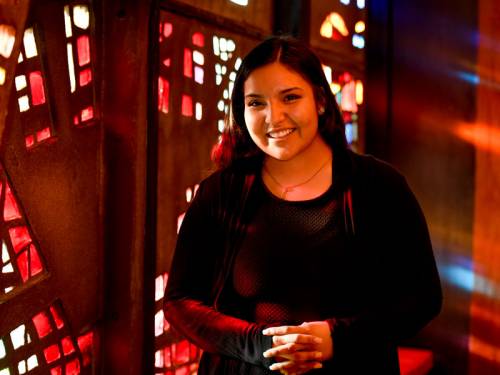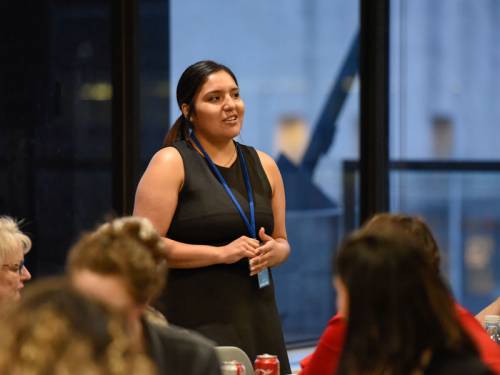UN Commission on the Status of Women prepared her for action and advocacy
by Gail Strange | Presbyterian News Service

Madison McKinney, 20, recently helped represent the Presbyterian Church (U.S.A.) at the 63rd session of the United Nations Commission on the Status of Women. (Photo by Rich Copley)
LOUISVILLE —For Madison McKinney, attending the 63rd session of the United Nations Commission on the Status of Women was an “incredible experience.”
“To hear all of the different languages and to meet people from all over the world was a once-in-a-lifetime experience,” she said.
McKinney, who was sponsored by the Native American Intercultural Congregational Support office of the Racial Equity & Women’s Intercultural Ministries, is the first Native American young woman to attend the Commission as a representative of the Presbyterian Church (U.S.A.). The 20-year-old was part of a group of young PC(USA) women attending the annual Commission for the first time.
As an adolescent, McKinney said she struggled to navigate between her two worlds. After she was born in Albuquerque, N.M., her family moved to South Dakota when she was three months old. “South Dakota has a very large Native population,” she said.
During her formative years there, McKinney said she was trying to figure out who she was. “While my friends and the community were Native American and practiced traditional Native American spirituality, both of my parents were Presbyterian pastors,” said McKinney. “I was trying to find a balance of participating in my culture while also practicing my Christian faith and typically those two don’t mix.”
McKinney says there have been moments in her life when she decided she would focus on her Native American culture or on the church, “but I was still missing something,” she said. “It wasn’t until we moved to Lawrence, Kansas, that I realized it’s OK to do both. It’s OK to be proud and participate in both aspects of my life, because that’s who I am. I couldn’t change who I was. I can’t pick or choose one over the other. I had to find a way to balance it out and over the years my faith and my spiritually have gotten a lot stronger.”
(Read more about McKinney’s upbringing in “All of my Relations,” an article she wrote for the Christian social justice journal “Unbound.”)

After helping to represent the PC(USA) at the UN Commission on the Status of Women, Madison McKinney had this to say: “To hear all the different languages, to see the regalia and to find out that all of these other countries care about the same matters has been amazing.” (Photo by Rich Copley)
McKinney says when she accepted both her Native culture and her Christianity she became more involved in the church. Her first endeavor with the church was to serve on the American Indian Youth Council, through the Native American Intercultural Congregational Support office. She then went on to serve as a liaison to the Native American Consulting Committee (NACC). “Serving as liaison to the NACC was my first involvement with a committee of adults and I learned a lot,” she said.
McKinney is currently serving for a second year on the session of her church. At her mother’s encouraging she applied and was accepted to serve on the Advocacy Committee for Women’s Concerns. “Things took off from there”, she said. “I was invited to attend the Commission on the Status of Women.” This sponsorship was again through the Native American Intercultural Congregational Support office.
When asked about factors that place Native culture and Church culture at odds, McKinney answered, “For the most part you don’t mix the two and there’s a lot of historical reasons for that. You either embrace your Native culture or Christianity. There’s a lot of negative feelings around Christianity because in Native Americans’ minds, Christianity was there to basically get rid of us.
“The feeling is,” she said, that “if you convert to Christianity you’re not a true Native American and you’re letting our ancestors down.”
McKinney said her parents helped her in both realms.
“They had to find the balance of being Christian and Native,” she said. “They made sure we knew and incorporated both practices in our lives. We took part in Native ceremonies, but we also practice Christianity. They showed us we’re just a mix of it all.”
“My faith doesn’t make sense but it’s a calling for me,” she said. “Sometimes my involvement in church created a conflict with my Native friends and others would say I was hanging out with the wrong group. They don’t want to trust the church and trust God, but I’ve found healing in the church.”
McKinney says in retrospect it was during the times that she pushed her faith away that God showed up most prominently. As a Native American, Madison says she has experienced racism. “I was always being told I wasn’t good enough,” she said. “And that’s when God would move. Just when I needed him the most, God would move every time.
“I would pray, and I would say, ‘If you’re God, show me the answer,’ and God’s timing was always perfect in providing me what I needed when I needed it.”
Growing up in church and reading Scripture, McKinney says she learned settlers were imposing injustices on Native Americans on their own, and it was not the Bible telling them to do so. “The Bible never told them to kick people off their land or to do them harm,” she said. “It was just people being evil and not the Bible. So, I find peace in that.”
As it relates efforts to by the PC(USA) to repudiate the Doctrine of Discovery, McKinney said, “We are grateful for the apology the church is offering but that was the past. The question is, what are you doing now, how are you going to help change the future? An apology only means something if it’s followed by actions.
“There were no suggestions or concrete ways offered to rebuild the relationship. We don’t blame the current Presbyterian church,” she said, “but the current church needs to do more to repair the relationship. There needs to be clear directions of wheat we’re going to do.”
McKinney says she’d like to see the focus on a commitment to rebuilding the relationship between Presbyterians and Native Americans. “After the apology we’re on the right track,” she said. “I’m hopeful!”
As to her experience during the Commission on the Status of Women, she said, “CSW has been amazing. I want to find more Native youth who are willing to come to events like this.”
“I’ve been empowered to be among other young women who care about these issues,” she said. “To hear all the different languages, to see the regalia and to find out that all of these other countries care about the same matters has been amazing.”
![]() You may freely reuse and distribute this article in its entirety for non-commercial purposes in any medium. Please include author attribution, photography credits, and a link to the original article. This work is licensed under a Creative Commons Attribution-NonCommercial-NoDeratives 4.0 International License.
You may freely reuse and distribute this article in its entirety for non-commercial purposes in any medium. Please include author attribution, photography credits, and a link to the original article. This work is licensed under a Creative Commons Attribution-NonCommercial-NoDeratives 4.0 International License.
Categories: Advocacy & Social Justice, Women’s Ministries
Tags: advisory committee for women's concerns, doctrine of discovery, madison mckinney, national indian youth council, Native American Intercultural Congregational Support, racial equity and women's intercultural ministries, unbound, United Nations Commission on the Status of Women
Ministries: Intercultural Ministries and Support for Congregations of Color, Racial Equity & Women’s Intercultural Ministries, Native American Intercultural Congregational Support